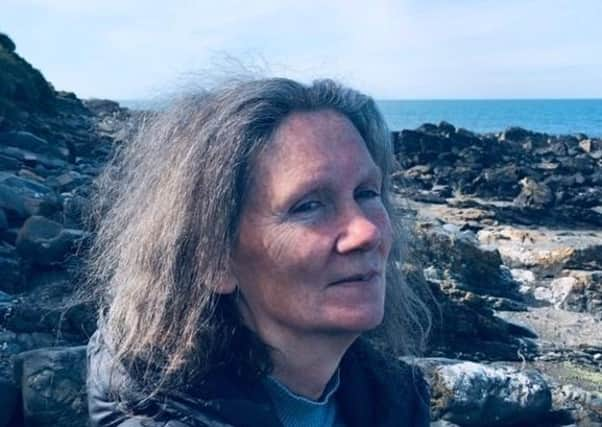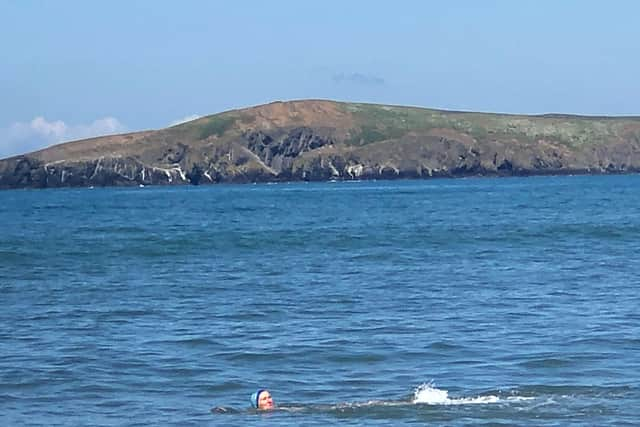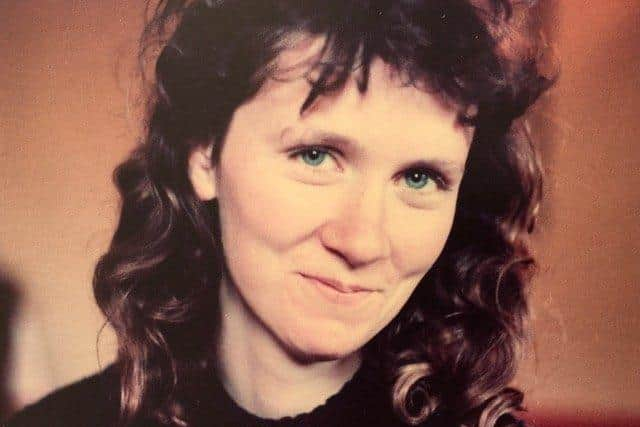Former teenage playwright Lenka Janiurek dives into painful past for unique book


There are not many autobiographies which begin with the author providing a detailed first-person account of their own birth – but Lenka Janiurek has not led an ordinary life and her new book is not an ordinary life story.
Each chapter of Watermarks: Life, Death and Swimming is something of a vignette with the theme of water; from the amniotic fluid surrounding her in the womb to memories of childhood summers by the sea at Filey to the persistent leak from the ceiling of her London flat as her marriage to the father of her first two children fell apart.
Advertisement
Hide AdAdvertisement
Hide AdThe book sees her recount escaping a number of controlling and abusive relationships and reflect on trying to find a place in a world and within a family, that don’t feel like your own. But it also ruminates on love, travel and the rich experiences that come with being a woman.


Janiurek, now 61, says that having a running theme helped her to make sense of her life story after being encouraged to write it by her youngest daughter.
“I wish I had kept a diary but writing this was like diving back into my memory,” she says. “It is a highly curated way of doing it but it felt better to do it like that. Using water as the theme was like having company.”
Her father was a Polish immigrant and concentration camp survivor who ran a bookshop in York and whose temper was so famous locally that children would make a game oftrying to wind him up. Janiurek was one of eight children and realised at the age of four she wanted to be a writer.
Advertisement
Hide AdAdvertisement
Hide AdThe book recounts her mother’s death from leukaemia when she was just nine years old. After her father’s new relationship ended, she was persuaded by her stepmother to move with her to London when she was 14.


“As a 14-year-old, going to London from Yorkshire was initially just ‘wow’. But the reality of that move was incredibly hard for me as a young woman.”
Despite her feelings of isolation in the capital, at the age of 17 she won the prestigious Young Writer’s Competition at the Royal Court Theatre and subsequently had three plays on at the Royal Court Theatre, a platform play at the National Theatre, and one at the Other Place with the RSC in Stratford-on-Avon.
She was a contemporary of fellow Yorkshire playwright Andrea Dunbar, and in 1982 her play Bows and Arrows was presented in a double bill alongside Dunbar’s Rita, Sue and Bob Too, which was turned into a film five years later.
Advertisement
Hide AdAdvertisement
Hide Ad“Andrea and I did have a bond, and a recognition that we were aware of very different realities than the Royal Court’s sphere. We shared a similar sense of humour. Perhaps that was a Northern thing.”
In the book, Janiurek reflects that success was something of a double-edged sword. “Being a playwright means people want to meet you,” it says. “Not to know or like you necessarily, but to collect you.”
She says today that being a young female playwright carried many challenges. “There was a great crowd of people. But the theatre is full of people who you don’t quite know whether they are acting or not. I did find it difficult. Andrea died when she was 29 and had a very tough life. Her experience of the reality of success was very difficult. Sarah Kane, another female playwright who came after us, died by suicide.
“I’m lucky to be alive in a way. At the time being a very young woman in that environment wasn’t easy. I obviously had these successes and was in the papers and on the radio but was still pretty skint. I had the best agent you could possibly have and on that I probably didn’t know how lucky I was. But I didn’t really have the skill-set that a lot of young white males have to make network connections for their careers.”
Advertisement
Hide AdAdvertisement
Hide AdJaniurek’s play-writing career effectively ended overnight when she left London at the age of 23 to move back up North. Her two children with her husband at the time were five and two but after the marriage broke down (the book describes her being subjected to “mental and physical violence”) and she left to move back north as a single parent, “life took over”.
After moving to Bradford, she kept her past secret from new friends for several years. “There was a gulf between Yorkshire and London. I didn’t tell anyone I had been a playwright, it wouldn’t have computed. Some of the people who were my closest friends who I met through having young kids, I didn’t tell them for five years.”
After 18 years in Bradford, a variety of jobs and two further children, Janiurek – at that point a single parent again following the breakdown of her relationship with her youngest daughter’s father and having gone through post-natal depression – moved the family to live ‘off-grid’ on a mountain in Wales in 2001.
The book reflects on the joys and challenges of such a lifestyle, as well as the impact of her and her youngest daughter both being diagnosed with chronic fatigue syndrome, ME. It also recounts an emotional trip to Poland years after her father’s death where she meets one of his cousins and comes to terms with what he had gone through after leaving behind his law degree joining the Polish army at 19 when the Second World War broke out.
Advertisement
Hide AdAdvertisement
Hide Ad“I realise my father had PTSD long before it was coined, after those years in the camps, in Hungary, and Spain, and France,” the book says.
“The whole atmosphere of my father and photographs tell me this. Pre-war he looks wary but hopeful, fresh and gawky. Post-war he is haunted and gaunt, a black-and-white refugee in Oxford tweed, sallow, with pinched cheekbones.
“I have inherited the chasm of separation. And a reservoir of emotions he ‘controlled’ with his coping mechanisms of foul temper, common sense and electrifying silence.”
She began writing her life story a couple of years ago after being encouraged to do so by her youngest daughter. It took her around three months to write, spending four hours a day in a cabin at the back of her garden.
Advertisement
Hide AdAdvertisement
Hide Ad“My ordinary life was in the house and I could kind of leave it there. Because I have chronic fatigue, that has really taught me self-care.”
She adds: “I’m glad my daughter prompted me; it made me flex my writing muscles. Writing is very deep for me but because of my life I lost quite a lot of confidence.
“I didn’t know if I could face writing my life story. But then coming up with the water idea really helped. Every chapter is quite short and almost like entering a different world in each one.
“Some of them were joyous and some were painful to write. But the act of writing and expressing yourself for me works as a way of reclaiming them.
Advertisement
Hide AdAdvertisement
Hide Ad“I was looking back at things I had put out of my mind or wanted to forget. But at this stage of life it is quite valuable that you can look back at a situation and say ‘yeah, that was a tough one’.”
Janiurek belongs to a local writers’ group and says they often discuss the strangeness of creating something about your own experiences.
“I think creating anything out of something that was real from your past kind of shifts your relationship with it. It is a tricky thing to do. It is like taking your clothes off in a way.
“I’m hopefully a bit more mature than when I was a young writer so you are looking back as a different person. But it was two years ago that I wrote it in a different part of my life again.”
Janiurek says her children are proud of the book.
Advertisement
Hide AdAdvertisement
Hide Ad“My youngest daughter has read it and she thinks it could have gone darker. I think the children are proud of me and the others are waiting to get a copy of it. They are really proud and supportive.
“I know my dad would have been proud. When my play that was in a double bill with Andrea Dunbar was published, my Dad bought 200 copies of it for his shop.”
While she still lives in Wales, she frequently comes back to Yorkshire. “I really love Yorkshire and I have still got friends in York and Bradford. I go back when I can, I just love it.
“I still keep in contact with my old English teacher in York and she was one of the first people who read the book. She is actually Welsh originally so it is funny I now live here.”
Advertisement
Hide AdAdvertisement
Hide AdJaniurek is now thinking of writing for the theatre again after the experience of doing the book but is unsure whether any new material would have an autobiographical element. “I would quite like to branch out in a way. But writers do tend to tackle their own lives and you can get the most raw material and very visceral experiences from such work.”
Watermarks: Life, Death and Swimming by Lenka Janiurek is published in hardback by Allison & Busby.
Editor’s note: first and foremost - and rarely have I written down these words with more sincerity - I hope this finds you well.
Almost certainly you are here because you value the quality and the integrity of the journalism produced by The Yorkshire Post’s journalists - almost all of which live alongside you in Yorkshire, spending the wages they earn with Yorkshire businesses - who last year took this title to the industry watchdog’s Most Trusted Newspaper in Britain accolade.
Advertisement
Hide AdAdvertisement
Hide AdAnd that is why I must make an urgent request of you: as advertising revenue declines, your support becomes evermore crucial to the maintenance of the journalistic standards expected of The Yorkshire Post. If you can, safely, please buy a paper or take up a subscription. We want to continue to make you proud of Yorkshire’s National Newspaper but we are going to need your help.
Postal subscription copies can be ordered by calling 0330 4030066 or by emailing [email protected]. Vouchers, to be exchanged at retail sales outlets - our newsagents need you, too - can be subscribed to by contacting subscriptions on 0330 1235950 or by visiting www.localsubsplus.co.uk where you should select The Yorkshire Post from the list of titles available.
If you want to help right now, download our tablet app from the App / Play Stores. Every contribution you make helps to provide this county with the best regional journalism in the country.
Sincerely. Thank you.
James Mitchinson
Editor
Comment Guidelines
National World encourages reader discussion on our stories. User feedback, insights and back-and-forth exchanges add a rich layer of context to reporting. Please review our Community Guidelines before commenting.